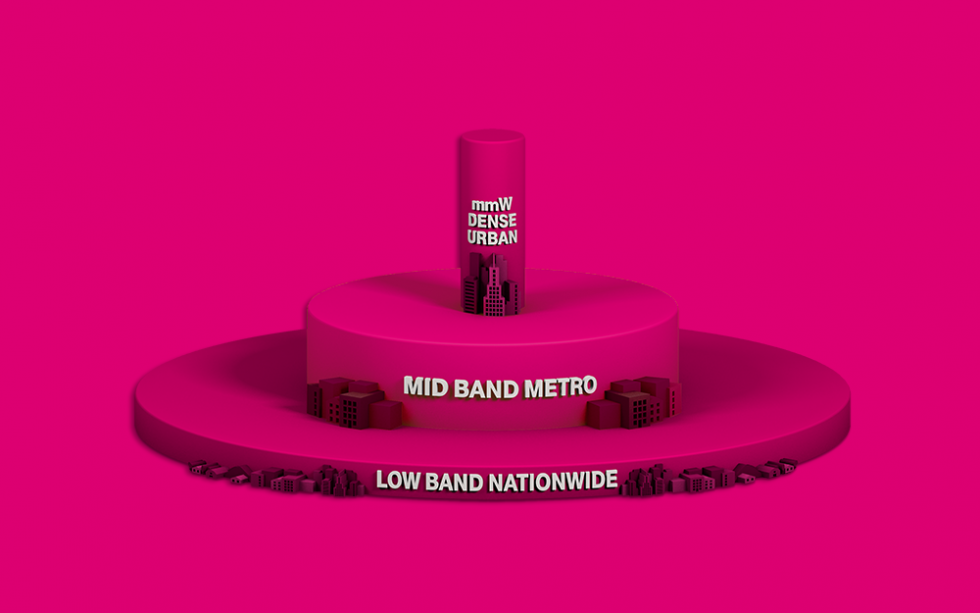The story of 5G over the past two years hasn’t been one to pay much attention to. Carriers have forced the logo on your phone and likely had a hand in making you pay for the technology that pushes it, all while your experience on their network hasn’t changed much. You either had “5G” that wasn’t any faster than your previous LTE connection, or you were told there was 5G somewhere in your city, on a random block, that could maybe produce 2Gbps speeds if you were standing on a street corner. In other words, 5G has been a bust.
Today, T-Mobile is firing up 5G you should actually care about.
When T-Mobile bought Sprint, they acquired a bunch of 2.5GHz spectrum that will be used as mid-band 5G and will be a portion of a 5G network that will produce meaningful speeds and connections. T-Mobile has had “nationwide” 5G for a while as low-band 5G, but it’s mostly like an LTE connection in terms of speeds and experience. Mid-band 5G is worth paying attention to.
T-Mobile says it has turned on mid-band 5G in over 80 cities and towns as of this morning. With this mid-band (2.5GHz) 5G, you could see speeds 7.5x greater than your current LTE connection. T-Mobile has suggested average download speeds around 300Mbps with peaks hitting 1Gbps.
To get a better feel for the importance of mid-band, T-Mobile’s layer cake graphic does a great job of explaining. Below, you can see the low-band 5G, the reach it has without the speeds (height in the cake). The mid-band might not reach as far, but it can still spread over large distances, while creating faster speeds. Then you have 5G mmW at the top, which is the super fast 5G that can barely work properly through a window and is more like a WiFi hotspot used in dense cities and stadiums. The mid-band is a good balance of reach and speed.
As a part of today’s news, T-Mobile released a list of cities that now have access to their mid-band 5G. Start scrolling to see if your town made the cut.
California
- Citrus
- La Puente
- Los Angeles
- Paramount
- San Fernando
- Willowbrook
District of Columbia
- Washington D.C.
Florida
- Azalea Park
- Holiday
- Progress Village
- Westchase
Georgia
- Atlanta
- Gainesville
- Mableton
- North Atlanta
- Winder
Illinois
- Bellwood
- Calumet City
- Chicago
- Chicago Heights
- Glendale Heights
- Hanover Park
- Ingalls Park
- Northlake
Indiana
- Merrillville
Maryland
- Towson
Massachusetts
- Holbrook
- Waltham
Michigan
- Bangor
- Decatur
Minnesota
- Maplewood
Missouri
- Jennings
New Jersey
- Camden
- Cliffside Park
- Fort Lee
- Hasbrouck Heights
- North Arlington
- Palisades Park
- Paterson
- Roselle
- Totowa
New York
- Copiague
- East Williston
- Freeport
- Garden City
- Garden City Park
- Harbor Isle
- Hempstead
- Island Park
- Lindenhurst
- Long Beach
- Malverne Park Oaks
- Middle Island
- Mineola
- New York
- Plainview
- West Hempstead
- Williston Park
North Carolina
- Clemmons
- Kernersville
- Pineville
- Stallings
- Statesville
- Winston-Salem
Oregon
- Aloha
- Newberg
- Sherwood
Pennsylvania
- Braddock
- Colwyn
- Darby
- East Lansdowne
- Kerrtown
- Meadville
- Philadelphia
- Rankin
- Yeadon
Texas
- Dallas
- Houston
- Nassau Bay
Virginia
- Bailey’s Crossroads
- Bull Run
- Highland Springs
- Lake Barcroft
- Newport News
- Sudley
- Tysons Corner
Washington
- Geneva
- Oak Harbor
- Snohomish
Again, this is big news in the 5G world. If you live in one of these areas and have a supported mid-band 5G phone, you might actually like 5G for the first time.
// T-Mobile


Collapse Show Comments17 Comments